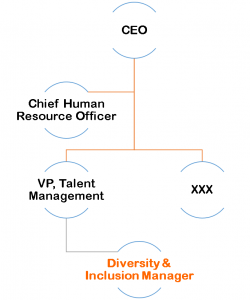 For years now we have recognized those companies who give high status to the chief diversity officer function by having it report to the CEO. As a matter of fact, organizations like DiveristyInc use the level from the CEO as part of their assessment criteria for consideration for the top 50 companies for diversity.
For years now we have recognized those companies who give high status to the chief diversity officer function by having it report to the CEO. As a matter of fact, organizations like DiveristyInc use the level from the CEO as part of their assessment criteria for consideration for the top 50 companies for diversity.
Over the past couple of years we are seeing what I will call a “mini” trend of moving diversity and inclusion into the talent management function.
There are pros and cons to having diversity report into talent management, with more cons than pros from my perspective.
Pros
- Talent management can include such areas as recruitment, retention, development, engagement, rewards and recognition, succession planning and strategic workforce planning. These are all areas that an organization would want to address from a D&I perspective.
- If the talent management function operates in a strategic way, engaging line managers and holding them accountable for results, rather than HR “running the show”, it can be a positive step towards achieving D&I goals.
- Placing D&I in talent management might be a part of a strategic move to integrate D&I into the “fabric” of the business.
Cons
- When D&I is under talent management, it will likely move the position further down in the organization, with more levels from the C-Suite. For example, the diversity lead may report to the head of talent management who reports to the CHRO who reports to the CEO.
- Depending on staffing levels, initiatives such as mentoring and employee resource groups may not get the proper attention.
- Talent management staff may not have in-depth diversity and inclusion competencies.
- D&I is about more than talent management. It also includes multicultural marketing, learning and development, supplier diversity and corporate social responsibility. If there are D&I components associated with these other functions, this might be a part of integrating D&I into all business functions.
- However, even if D&I is well integrated into the business functions, who has overall responsibility for leading D&I and accountability for results?
I believe that D&I should absolutely be an integral part of talent management but I also think that is shortsighted to limit the scope to talent management. In the era of “chief officers” (marketing financial, HR, ethics and Information), I advocate for “diversity and inclusion” to continue to be among them.


















